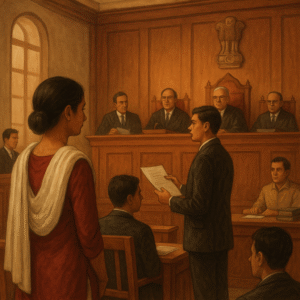Simplified Explanation of the Judgment
In a sensitive and closely contested criminal appeal, the Patna High Court partially allowed the appeal of a convict, who was found guilty of rape under Section 376(1) of the Indian Penal Code (IPC). The Court upheld the conviction but reduced the sentence from ten years to seven years of rigorous imprisonment, along with the previously imposed fine.
The case stemmed from a 2015 FIR filed by a woman who alleged that early in the morning, while she was at home and her mother had momentarily gone out, the accused entered the house and raped her. She immediately informed her mother, and later, a village panchayat was convened. However, the accused did not attend the panchayat.
During the trial, the victim consistently supported the allegation through her statement to the police, testimony before the Magistrate under Section 164 CrPC, and in her deposition before the court. Her mother and a neighbor corroborated her account—both claimed to have seen the accused fleeing the house around the time of the alleged incident.
Medical evidence presented by a board of three doctors supported the fact that there was prior sexual activity. Although no recent signs of sexual assault were conclusively found—largely because the victim had bathed shortly after the incident—the doctors confirmed the hymen was ruptured and there were signs of sexual contact.
The defense claimed the victim falsely accused the appellant due to an old family land dispute. They also pointed to procedural lapses: the sperm-stained clothes were not seized, no injuries of resistance were found, and the original medical report was not exhibited. However, the High Court noted that:
- The prosecutrix was consistent and reliable in her statements.
- Her testimony was corroborated by other witnesses and medical findings.
- The absence of the original medical report did not create prejudice since doctors testified based on the carbon copy and no contradiction was shown.
- There was no current land dispute between the families, as confirmed by defense witnesses.
The Court held that while certain lapses did exist in investigation and evidence collection, they were not substantial enough to overturn the conviction. However, on the matter of sentencing, the Court agreed to reduce the punishment from 10 years to the statutory minimum of 7 years, citing lack of brutality or aggravating factors beyond the offence itself.
Significance or Implication of the Judgment
This judgment holds dual importance:
- It reaffirms the principle that a consistent and credible testimony of a victim can form the basis of conviction, even in the absence of physical injuries or original medical records, especially under the amended definition of rape in IPC.
- At the same time, it recognizes proportionality in sentencing, emphasizing that harsher sentences must be based on additional aggravating circumstances like violence or abuse of power.
This approach by the Patna High Court balances victim justice with fairness in criminal sentencing, and sets a precedent for both prosecution standards and sentencing discretion in sexual offence cases.
Legal Issue(s) Decided and the Court’s Decision with reasoning
- Whether the conviction under Section 376(1) IPC was valid despite lack of physical resistance or injuries?
✔ Yes. The victim’s testimony was found consistent and reliable, corroborated by witnesses and doctors. The absence of resistance or injury does not imply consent, as per Explanation 2 to Section 375 IPC. - Was the conviction weakened due to lack of original medical report and procedural lapses?
❌ No. The Court held that the substantive testimony of all medical board members based on carbon copies was sufficient and unchallenged by defense. - Did the land dispute between families raise a credible motive for false implication?
❌ No. The Court found no evidence of an ongoing land dispute at the time of the offence. - Should the sentence of 10 years be upheld or reduced?
✔ Reduced. Since there were no brutal or aggravating factors, the Court reduced the sentence to 7 years—the statutory minimum for rape under Section 376(1) IPC.
Judgments Referred by Parties (with citations)
- Santosh Prasad @ Santosh Kumar v. State of Bihar, (2020) 3 SCC 443
- State of Karnataka v. Mapilla P.P. Soopi, (2003) 8 SCC 202
- Munna v. State of Madhya Pradesh, (2014) 10 SCC 254
- Sunil Kundu and Another v. State of Jharkhand, (2013) 4 SCC 422
Judgments Relied Upon or Cited by Court (with citations)
- Mukesh v. State of Chhattisgarh, (2014) 10 SCC 327
- Sunil Kundu and Another v. State of Jharkhand, (2013) 4 SCC 422
- Munna v. State of Madhya Pradesh, (2014) 10 SCC 254
Case Title
Sanjit Kumar v. State of Bihar
Case Number
Criminal Appeal (SJ) No. 925 of 2017
Citation(s)
2021(1)PLJR 123
Coram and Names of Judges
Hon’ble Mr. Justice Birendra Kumar
Names of Advocates and who they appeared for
• Mrs. Soni Srivastava and Mr. Ravi Bhardwaj – For the appellant
• Mr. Bipin Kumar (APP) – For the State
• Mr. Ravi Shankar Pankaj – For the informant
Link to Judgment
https://patnahighcourt.gov.in/viewjudgment/MjQjOTI1IzIwMTcjMSNO-BZSAsgDgQZM=
“If you found this explanation helpful and wish to stay informed about how legal developments may affect your rights in Bihar, you may consider following Samvida Law Associates for more updates.”









